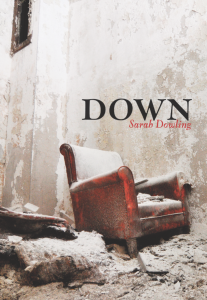86 pages, $17.95
By Klara du Plessis
Attempting to tidy the bedroom, down escapes from the pillow. Imagine this feather floating gracefully, not quite ascending, but taking its time to land. Sarah Dowling’s third collection of poems, Down, appears deceptively light at a first glance, then a sequence of “Bury It” poems emerge and proliferate. Constructing a dichotomy between light, light-hearted and popular, and dark, introspective and difficult, everything goes “well / well” in these pages, “but the only problem is / the burial m-hm.”
Dowling appropriates diverse sources from both popular culture and academic circles – lyrics from Aaliyah and The Temptations, a Frank O’Hara poem, articles and interviews on fine arts and rhetoric. She then manipulates this material, chopping, rearranging, repeating and rendering it unrecognizable, so that the resulting verse is neither a series of found poems nor erasures. As a poetic black box, Dowling inputs text that is readily available to the public and transforms it into a highly private vocabulary with which to express herself. Take the poem “Starlight tours,” for example:
, though a and him He who The ‘midnight on
cold in had was bitterly , ride’ bitterly
winter was fresh taken cold lonely cold
bloodied field
out night night nights (48)
Apart from a Gertrude Stein-like mouthfeel, the words themselves are simple with lots of open space to breathe. Sentimental phrases seem familiar, but potential pop song references linger as background noise only and don’t assert themselves as direct allusions. Sure, a mysterious male, loneliness and nighttime could be the subject matter of just about any pop song. Yet the way that these concepts are dismantled on the page removes any definitive semantic intention in favour of a more intuitive reading experience – that is, although the poem would be difficult to summarize, interpretative clues linger between the lines. The upper case “He,” for instance – probably the repositioned subject of a sentence – now calls attention to itself right in the middle of a line, smacking of authority, an emphatic personage looming over the poem. Similarly, ungrammatical phrases like “, though a and” or the stuttering “night night nights” create a wavering atmosphere of insecurity, an unwillingness to communicate all the facts.
Dowling’s reticent, cut-up language counteracts the inherently communicative nature of the written word. Case in point, she asserts, “I’ve got to tell you to tell everyone I always think in my mouth.” With the intention to convey a message, that message travels along a broken telephone-like trail just to stay confined to the mouth where information is chewed up and disordered. The mouth is both a soft enclosure and a violent trap. So to think with the mouth is also to step aside from rationality and embrace a deliberately non-linear mode of expression. As Dowling indicates in her “Process Notes,” “I wanted to write in the language […] that I do not yet speak […] It was all the tension between telling and not telling.”
Although Dowling’s cut-up language, by definition, lends a touch of violence to the collection, she also offers a handful of borderline innocent poems, love and sex being portrayed with the rosy promise of experiencing “a girlFor the first time.” By the time the proverbial “birds” and “bees” feature (“Sunshine Honey”), one is urged to pencil “beautiful!” in the margins as Dowling concedes self-consciously, “The bees, aesthetics, me.”
All in all, I’m down with Down.
***
Follow poet Klara du Plessis on Twitter. She writes essays and reviews for Broken Pencil, Lemon Hound and Matrix Magazine. Her manuscript Hell light flesh was on the shortlist for the 2015 Metatron Prize. Her manuscript Painted Women was on the shortlist for the 2013 Robert Kroetsch Award for Innovative Poetry. Klara curates the monthly, Montreal-based Resonance Reading Series.
![[PANK]](http://pankmagazine.com/wp-content/themes/pank/assets/images/pank-logo-large.png)

